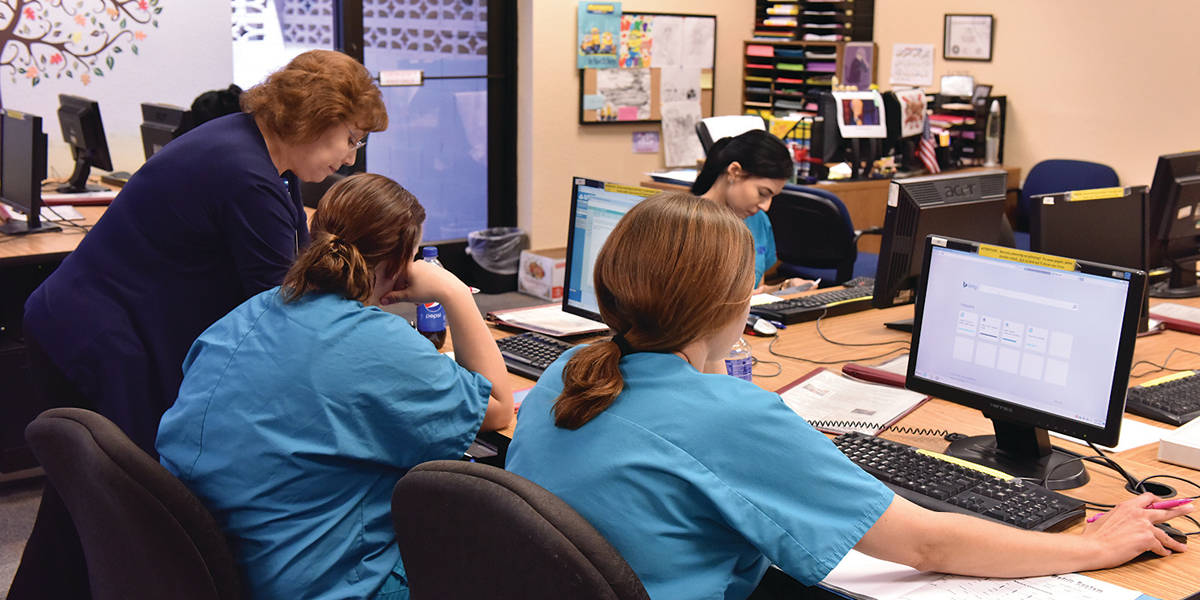Last Updated on December 29, 2022
One may work as a medical biller and coder in a variety of settings. These may include private practices, insurance companies, legal firms, hospitals, accounting offices, nursing homes, or pharmacies. One may also work in the investigation of claims for the government of insurance companies. Additionally, the opportunity may present itself to work as a billing analyst.
Read more about medical billing and coding schools near me, medical billing and coding schools los angeles, medical billing and coding community college near me, and medical billing and coding schools in california.

What Are Some Career Options in Medical Billing and Coding?
Career options for individuals interested in working in the field of medical billing and coding go beyond working as a biller or coder. With additional education, one career option in medical billing and coding is a health information technician.View Schools
Career Options
To enter the field of medical billing and coding, one must complete high school and then earn a certificate in medical billing and coding from a community college or vocational institute. Graduates from the certificate program may take an entry-level position as a medical biller, medical coder, or a medical biller and coder. However, there are other career options open to individuals looking to work in the field of medical billing and coding.
Important Facts about this Career
| Median Pay (2020) | $44,090 (for all medical records and health information technicians)* |
| Job Outlook (2019-2029) | 8% growth (for all medical records and health information technicians)* |
| Certification/Licensing | Preferred by most employers |
| Similar Occupations | Medical Transcriptionists, Administrative Assistants, Medical and Health Services Managers, Medical Assistants |
Source: *U.S. Bureau of Labor Statistics

Medical Billing and Coding Schools and Courses
You can train for a medical billing and coding career in the classroom or online. Keep reading for more information on schools that offering training programs and the types of courses that you could take. Online training options are also addressed.View Schools
What You Need to Know
Medical billing and coding professionals deal with problems regarding insurance claims and billing for healthcare. Schools offer undergraduate programs for prospective students in either on-campus or online formats to provide flexible scheduling.
| Degree Options | Certificate, diploma, or associate degree in medical billing and coding |
| Online | Fully online programs are available |
| Schools | Look for schools that offer preparation for coding exams and credentials, as well as programs taught by nationally certified medical coders |
What Will I Learn at a Medical Billing and Coding School?
As a medical billing and coding student, you’ll learn how to solve insurance problems, process claims and third-party reimbursements, file claims manually, trace delinquent claims, appeal denied claims, streamline billing processes, complete insurance forms and use CPT and ICD-9 manuals. Some general course topics may include:
- Anatomy
- State and Federal Healthcare Regulation
- Medical Laws and Ethics
- Physiology and Medical Terminology
- Diagnosis Coding
- HIPAA and Electronic Data Interchange
Schools for Medical Billing and Coding
Here is a list of schools that offer training in medical billing and coding, as well as some course examples from their curriculum:
- Penn Foster Career School (online): Certificate Program: Law, Ethics, and Confidentiality, Medical Billing and Health Insurance, Pathology and Pharmacology
- Cal State East Bay (Oakland, California): Certificate Program: Evaluation and Management Services, Introduction to the CPT Manual, Managed Care Systems
- Grantham University (online): Associate of Applied Science: Medical Terminology, Medical Assisting, Algebra, Introduction to Health Information Management
- Rasmussen College (online): Certificate Program: Coding Foundations, Pathophysiology and Pharmacology for Health Information
- Remington College (various locations): Diploma Program: Career Development Fundamentals, Anatomy and Physiology for Visceral Structures, Medical Records Management
What Technical Requirements Will I Have to Meet?
You’ll need a computer with Internet access. You’ll also need an e-mail address and the necessary software to view course content and interact with classmates or instructors. Depending on the course, you may need to purchase Microsoft Office. Some software might be available for free download, including Adobe Flash Player, Acrobat Reader, and Windows Media Player.
Some schools may require you to log in to an online course management system where you can submit assignments, quizzes, and tests, and participate in online discussions. In the online program, you can also view slideshows and video clips, listen to audio lectures, participate in chat sessions, and view live demonstrations given by your professors. Phone support and an online library may be available when you need assistance.
How Do I Choose the School That’s Right for Me?
Decide whether you’d like to enroll in an on-campus or online program. Look for programs that offer courses taught by nationally-certified medical coders. These individuals can bring industry insight into the classroom and give you an up-close and personal view of the subject matter. You might want to look for programs that prepare you to sit for certification exams such as the Certified Professional Coder exam (CPC or CPC-H Apprentice), the American Health Information Management Association’s Certified Coding Associate (CCA), or the American Academy of Professional Coders (AAPC) exam. Many employers prefer to hire credentialed medical billers and coders.
